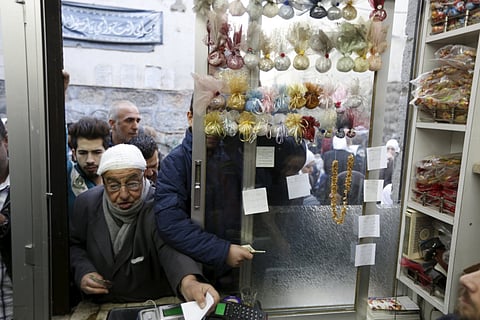Damascus no longer affordable for its residents
Price of goods has skyrocketed while salaries have dropped due to devaluation of Syrian pound

Damascus: For many living in the Syrian capital, largely untouched by the brutal war surrounding it, the cost of living has become unbearable.
Prices have increased at least three-fold, from subsidised goods to luxury items. While prices have gone through the roof, the value of salaries has decreaseddramatically given extent to which the Syrian pound has fallen against the dollar. All this has made life painfully expensive for Damascus residents.
Many, unable to afford living in the cosmopolitan city any longer, have packed their bags and left.
The inflation, however, has not surpassed the devaluation of the Syrian pound, which went from 50 to an astonishing 400 to the dollar, making it the highest ever in Syrian history.
For example, a bundle of subsidised flat bread (seven loaves) used to sell for 8 SP or 16 cents, and now costs 75 SP. White sugar used to cost 15 SP/kg and now costs 265 SP. A kilogramme of tomatoes, which used to be 10 SP now costs a whopping 400 SP.
Meat, rarely affordable for most Syrians even before the war when it cost around 700 SP/kg, now costs 4,000 SP, making it permanently unaffordable for nearly any Syrian.
The locally-made cigarette Al Hamra, which used to cost 25 SP and was in high demand by blue collar workers and labourers, now costs 200 SP.
Conversely, the monthly salary of a Syrian cabinet minister in Syrian pounds, which used to be the equivalent of $1,500 (Dh5,500) a month is now the equivalent of only $187.
Senior bankers used to make the equivalent of $2,000 a month, which made them upper middle-class citizens. Now they make the SP equivalent of only $500.
Chauffeurs’ salaries have dropped in value from $300 to $150 a month.
Many Syrians have been forced to sell their homes in order to bankroll their migration to Europe, Lebanon, Turkey or the Gulf.
With so many Syrians putting their houses on the market, the real estate market has plummeted.
An average house in the neat residential districts of Damascus, like Al Rawda or Mezzah, can be bought for $75,000 to $100,000, which is peanuts compared to world standards.
A 300,000 metre luxury home in Al Malki, home of the city’s moneyed elite, sells today for $750,000, which is nothing compared to similar real estate in A-class districts of neighbouring Beirut.
Ancient homes once occupied by Ottoman pashas in the Old City, which are run down but extremely spacious, are now being shared by displaced families.
Though the prices have sky-rocketed, they are still extremely cheap for foreigners or Syrians who are paid in foreign currency.
Most foreigners live and work at the five-star Four Seasons Hotel on Shukri Al Quwatli Boulevard. A dinner for two at one of its restaurant costs $75 but if they go to the Old City, they can find good quality food, including alcohol, for half of the price.
Sign up for the Daily Briefing
Get the latest news and updates straight to your inbox


